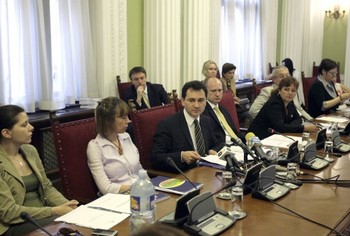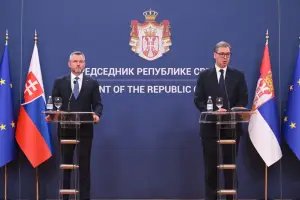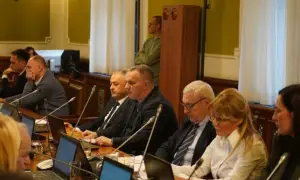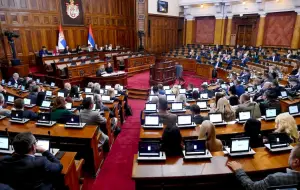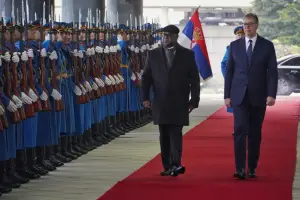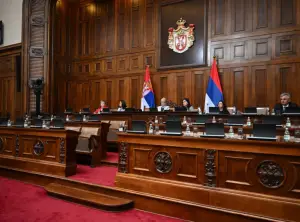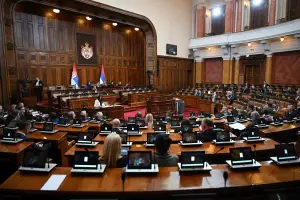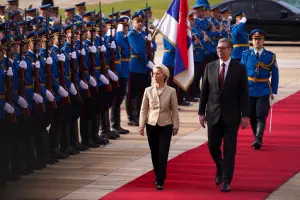Q:
A:
Government efforts to secure visa liberalisation by early next year
Belgrade,
21 May 2009
Deputy Prime Minister for EU Integration Bozidar Djelic today stated that the European Commission’s report on the Western Balkans’ progress concerning visa liberalisation is in Serbia’s favour, stressing that the government will do all it can to secure the abolition of visa restrictions by early next year.
At a session of the Serbian parliament’s EU board, Djelic said that the European Commission’s report gives no recommendations for visa abolition, but shows whether Serbia has met preconditions set forth in the “road map”.
The Minister explained that consultations concerning the European Commission’s report are underway.
According to Djelic Serbia may be included in the Schengen “white list” during the Swedish presidency over the European Commission in the last quarter of 2009, so we still have enough time to take additional steps.
Minister Djelic pointed out that the Serbian parliament has already adopted all the basic laws required for the removal of visa restrictions. He explained that the issuance of biometric passports to those from Kosovo is a matter about which doubts have been raised but they will be issued passports according to a procedure which will ensure that these passports cannot be misused.
Serbia will respect its Constitution and issue passports to citizens living in Kosovo, reiterated Djelic, adding that the fact that there has been no Serbian police presence in the southern province for nearly 10 years now must be kept in mind while considering this issue.
He said that nearly 600,000 new passports have been issued in Serbia up until now and the European Commission has approved the quality of these passports.
He said that it is the government’s opinion that Hague tribunal Chief Prosecutor Serge Brammertz’s report will be sufficient for the unblocking of the transitional trade agreement between Serbia and the EU, but the final decision will be up to the EU countries.
The Deputy Prime Minister presented the report on the implementation of the national programme for EU integration during the period January-March 2009 to the Serbian Parliament’s EU integration committee.
According to the report drafted by the Serbian government’s EU Integration Office, taking into account all laws that were adopted during the first trimester of this year, 53% of the programme was implemented this year as 36 of the planned 68 regulations were adopted.
He stressed that this year the Serbian Parliament passed a large number of laws and thus major progress was made in EU integration, adding that he hopes that the implementation of the national programme will be even more successful during the second trimester of this year.
Djelic pointed out that a decrease in funds envisaged by the budget revision will not thwart Serbia’s EU integration, recalling that the main aim of the National plan is to make Serbia ready to join the EU in 2012.
The Minister specified that due to the implementation of the SAA, customs income decreased by €17 million in the first three month of 2009, adding that had it not been for trade benefits, Serbian businesspeople would have paid €385 million of customs last year.
Trade benefits have helped Serbia attract foreign investors, said Djelic, stressing that in the first three months of 2009 around €1786 million of foreign investment came to Serbia.
Speaking to the press, Djelic said that US Vice President Joe Biden’s visit to Serbia marked a new phase in relations between the two countries.
Biden’s statement that the US is of the opinion that recognising Kosovo should not be made a condition for Serbia for acquiring EU membership and that Serbia should not be pressurized to join NATO if that is at conflict with Serbia’s national policy reaffirms Serbia’s central position in the region.
The Minister explained that consultations concerning the European Commission’s report are underway.
According to Djelic Serbia may be included in the Schengen “white list” during the Swedish presidency over the European Commission in the last quarter of 2009, so we still have enough time to take additional steps.
Minister Djelic pointed out that the Serbian parliament has already adopted all the basic laws required for the removal of visa restrictions. He explained that the issuance of biometric passports to those from Kosovo is a matter about which doubts have been raised but they will be issued passports according to a procedure which will ensure that these passports cannot be misused.
Serbia will respect its Constitution and issue passports to citizens living in Kosovo, reiterated Djelic, adding that the fact that there has been no Serbian police presence in the southern province for nearly 10 years now must be kept in mind while considering this issue.
He said that nearly 600,000 new passports have been issued in Serbia up until now and the European Commission has approved the quality of these passports.
He said that it is the government’s opinion that Hague tribunal Chief Prosecutor Serge Brammertz’s report will be sufficient for the unblocking of the transitional trade agreement between Serbia and the EU, but the final decision will be up to the EU countries.
The Deputy Prime Minister presented the report on the implementation of the national programme for EU integration during the period January-March 2009 to the Serbian Parliament’s EU integration committee.
According to the report drafted by the Serbian government’s EU Integration Office, taking into account all laws that were adopted during the first trimester of this year, 53% of the programme was implemented this year as 36 of the planned 68 regulations were adopted.
He stressed that this year the Serbian Parliament passed a large number of laws and thus major progress was made in EU integration, adding that he hopes that the implementation of the national programme will be even more successful during the second trimester of this year.
Djelic pointed out that a decrease in funds envisaged by the budget revision will not thwart Serbia’s EU integration, recalling that the main aim of the National plan is to make Serbia ready to join the EU in 2012.
The Minister specified that due to the implementation of the SAA, customs income decreased by €17 million in the first three month of 2009, adding that had it not been for trade benefits, Serbian businesspeople would have paid €385 million of customs last year.
Trade benefits have helped Serbia attract foreign investors, said Djelic, stressing that in the first three months of 2009 around €1786 million of foreign investment came to Serbia.
Speaking to the press, Djelic said that US Vice President Joe Biden’s visit to Serbia marked a new phase in relations between the two countries.
Biden’s statement that the US is of the opinion that recognising Kosovo should not be made a condition for Serbia for acquiring EU membership and that Serbia should not be pressurized to join NATO if that is at conflict with Serbia’s national policy reaffirms Serbia’s central position in the region.

